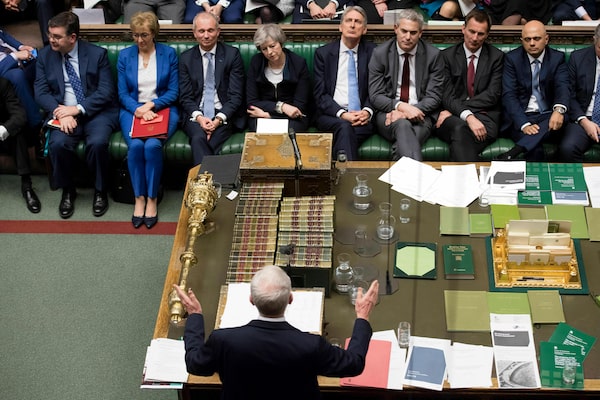
In this image issued by the House of Commons, British Prime Minister Theresa May, top center, listens to Labour leader Jeremy Corbyn after losing a vote on her Brexit plan on Jan. 15, 2019.Jessica Taylor/The Associated Press
One reason government exists is to allow people to go to bed at night with some confidence about what they will wake up to in the morning. On that score, the British political class gets a failing grade. Instead of generating confidence in the future, it has spent the last two-and-a-half years generating ever higher levels of anxiety-inducing insomnia about what terrors the morrow will bring.
And on Tuesday in the British House of Commons, the dial was turned up to 11.
The moment of Brexit looms ever closer. The choice of not Brexiting remains, for a majority of members of Parliament, unacceptable. But a decision on how to Brexit remains unattainable.
The country is hurtling toward the cliff, and the United Kingdom’s politicians still can’t come to a consensus on whether they want to hit the accelerator or the brake, or turn the steering wheel.
Democratic politics is supposed to be a system for resolving disputes and for governing. Governing is about providing some level of stability and certainty. Stability and certainty are what British politics, in the aftermath of the Brexit referendum, has completely failed to deliver.
Is the U.K. leaving the European Union? Officially, yes. Unofficially, maybe.
If there’s a divorce, what will be the terms? Unknown. MPs have overwhelmingly rejected the Brexit proposal negotiated by Prime Minister Theresa May’s government.
Will the U.K. exit the EU on March 29, or will the deadline be extended? Yes.
Will divorce happen through a so-called hard Brexit, without any agreement with the EU? Or will it be a negotiated departure? Yes.
Could a negotiated departure ultimately happen under terms almost identical to those the House of Commons just overwhelmingly rejected? Yes.
Will Ms. May be prime minister in the spring, when Brexit is supposed to happen? Maybe.
Would it not make sense for the government of the United Kingdom to negotiate the best deal possible and then ask the people, in a referendum, to choose between that proposal for leaving the EU and the status quo of remaining in the EU? Yes.
So will that happen? Don’t be ridiculous.
Will there be an election in the coming months? Possibly.
But for that to happen, wouldn’t some Conservative MPs have to vote non-confidence in their own government? Possibly. Stranger things have happened. After all, Brexit was only triggered because then-prime minister David Cameron called a referendum on leaving the EU, in the hope of decisively losing said referendum. Instead, he “won.” British humour is dry and ironic.
If polls now say that most British people are against Brexit, why are both of the major political parties, and most of their MPs, still in favour of it? That’s complicated.
Why, given that Ms. May’s signature program has been overwhelmingly rejected by the House of Commons, is she still PM? There is no other candidate the House dislikes less.
What is Brexit supposed to achieve? It’s not clear that anyone knows anymore.
The U.K. is basically at war against itself. The EU, ostensibly the target of the Brexit quest, is largely disengaged and barely interested. Mollifying British voters is obviously not top-of-mind for European leaders. Britain staying or leaving matters far less to the overall European economy than to the much smaller British economy.
The situation is akin to last year’s Canada-United States trade negotiations – except imagine that it was Ottawa, not Washington, that was threatening to rip up the North American free-trade agreement. Further, imagine that ending the agreement was not just a threat but Ottawa’s goal. And imagine that Ottawa was also demanding concessions and gestures of goodwill from the White House.
Politics is the art of the possible. Impossible politics is the art of succumbing to delusions.
The good news, if any, is that on Tuesday Britain’s elected representatives were asked to make a decision. They did not arrive at an answer to the crisis, but they voted on one possible answer, which they overwhelmingly rejected.
The bad news is they rejected it because Parliament still cannot agree on how to get Britain out of this mess of its own creation.